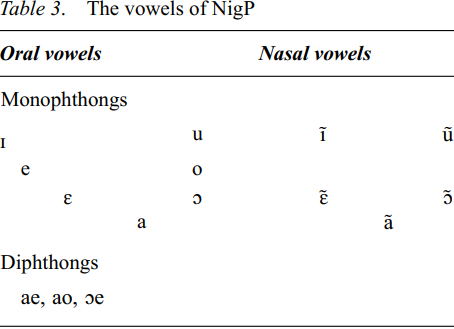


 Grammar
Grammar
 Tenses
Tenses
 Present
Present
 Past
Past
 Future
Future
 Parts Of Speech
Parts Of Speech
 Nouns
Nouns
 Verbs
Verbs
 Adverbs
Adverbs
 Adjectives
Adjectives
 Pronouns
Pronouns
 Pre Position
Pre Position
 Preposition by function
Preposition by function 
 Preposition by construction
Preposition by construction
 Conjunctions
Conjunctions
 Interjections
Interjections
 Grammar Rules
Grammar Rules
 Linguistics
Linguistics
 Semantics
Semantics
 Pragmatics
Pragmatics
 Reading Comprehension
Reading Comprehension|
Read More
Date: 2024-03-26
Date: 2024-04-12
Date: 2024-02-28
|
Across Nigeria, the majority of the dialects of NigP have a simple seven-quality vowel system. However, there are also diphthongs, which are double quality vowels that nonetheless function as single syllable nuclei. A complete inventory of NigP vowels would therefore be as in table3;

The three diphthongs listed here correspond to what are normally [aɪ] , [aʊ] and [ɔɪ] respectively in Standard British English (StdBrE). In the established numbering of English vowels, these are numbers 15, 16, and 17 respectively, the rising diphthongs. This analysis differs from that of Mafeni (1971), for whom words such as /praod/ proud and /smael/ smile end in consonant clusters – /prawd/ and /smayl/ respectively. Moreover, in Mafeni’s system, the word /bɔe/ boy would be /bɔy/, ending in a consonant. Thus Mafeni recognized no vowel sequences and no diphthongs in NigP. By contrast, Elugbe and Omamor (1991) recognized these three diphthongs as /ai/, /au/, and /ɔi/ respectively. In fact, the terminal point never goes as high as /i/ or /u/ – hence /ae/, /ao/, /ɔe/ here.
In NigP as well as in NigE, another pair of rising diphthongs, English vowel number 13, /eɪ/ , and number 14, /oʊ/ or /əʊ/ are [e] or [ee] and [o] or [oo] respectively. The double vowel form is found in word-final open syllables while the single vowel pronunciation occurs in closed syllables. At a recent workshop on translating the Bible into NigP, the above rule was found to separate words such as NigP wet ‘wait’ from wee ‘way’. Thus, ‘The way in which it was written by John’ is rendered as di wee we John (tek) raet am. The relative marker ‘which’ is we’ with a short vowel in NigP, whereas the noun ‘way’, with an open syllable is wee.
The centring diphthongs of StdBrE are numbers 18, /ɪə/ , 19, /εə/ , and 20, /ʊə/ . In NigP, these may be analyzed as sequences of vowels, (Elugbe and Omamor 1991). Thus we find the following correspondences between StdBrE and NigP: StdBrE centring diphthongs in NigP:
–  ear is NigP /ia/ with a distinct, albeit weak /j/ between the twin qualities of the diphthong: [ija].
ear is NigP /ia/ with a distinct, albeit weak /j/ between the twin qualities of the diphthong: [ija].
–  air is NigP /εa/ or /εε/ – in each case they are two distinct vowels.
air is NigP /εa/ or /εε/ – in each case they are two distinct vowels.
– /ʊə/ poor is /puɔ/ with a weak /w/ between the two vowel qualities of the diphthong: /puwɔ/
It should be noted here that the alternative to [ʊə], which in StdBrE is [ɔ:], (for example /pʊə/ or /pɔ:/ ‘poor’) does not feature in NigP. The vowels of NigP were clearly based on a variety of English which did not alternate /ʊə/ with /ɔ:/. However it did recognize the vowel /ɔ:/ which, like /ɔ/ or /ɒ/, corresponds to NigP /ɔ/. For example, the utterances in (1) and (2) are both said without a distinction between pot and Port (Port Harcourt):

Without the prepositions, the two utterances sound exactly the same.
It can be seen therefore that the simplification of the English vowel system in NigP followed very clear lines as shown in table 4.

Table 5 below exemplifies the vowels of NigP:

|
|
|
|
دور في الحماية من السرطان.. يجب تناول لبن الزبادي يوميا
|
|
|
|
|
|
|
العلماء الروس يطورون مسيرة لمراقبة حرائق الغابات
|
|
|
|
|
|
|
ضمن أسبوع الإرشاد النفسي.. جامعة العميد تُقيم أنشطةً ثقافية وتطويرية لطلبتها
|
|
|